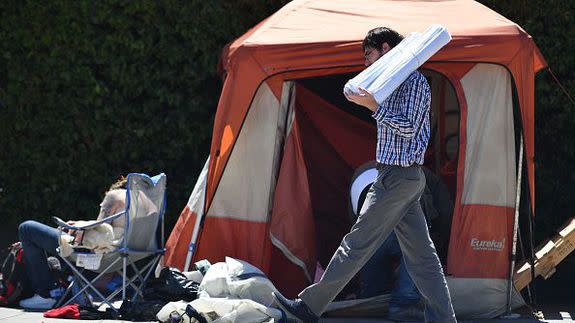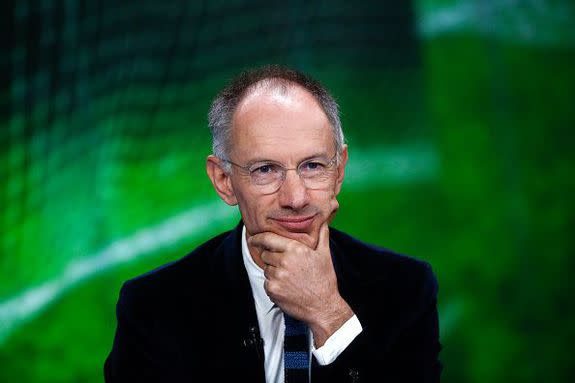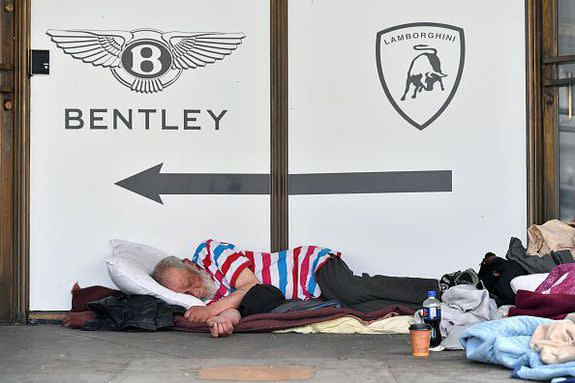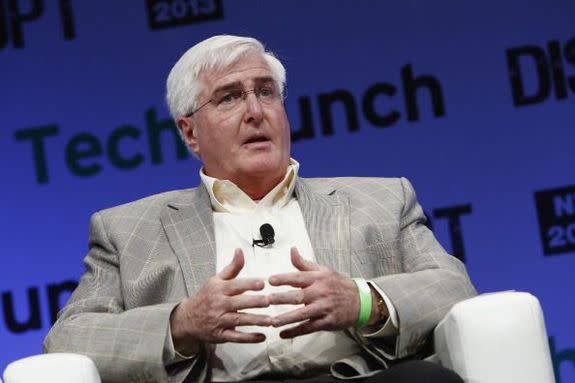Tech investors are backing a law to ban homeless camps in San Francisco

In a city where poverty rates are at historic highs, the homeless population living in tents along the sidewalks could soon be forced to leave.
A collection of so-called 'tent cities' have sprouted up in San Francisco and nearby areas, with a single street housing as many as 250 people. But the tents they stay in could be taken by police and they'd be forced to leave within 24 hours, if a new law passes this November.
SEE ALSO: What six survivors of homelessness want you to know
Proposition Q would allow city employees or officers to give encampment residents 24-hour notice to leave. They would offer to hold a person's possessions for up to 90 days and "homeless services" such as a bus ticket out of town or a stay at the local shelter, according to the bill. But the shelter's provided only if there's room, and overcrowding's common.
The bill doesn't offer more funding for shelters or other services, but its mission to get people off the streets one way or another has gained the support of some in the Bay Area tech elite.
Among donors are Sequoia Capital chairman Michael Moritz, who Forbes estimates has a net worth of $3.1 billion, investor Ron Conway, who's backed companies such as Google and Buzzfeed, and hedge-fund investor William Oberndorf, The Guardian reported.
They have reportedly contributed nearly $50,000 each, backing a substantial 60 percent of the campaign's total funding. The tech investor husband of Yahoo! CEO Marissa Mayer, Zacahry Bogue, also donated $2,500.

Image: Simon Dawson/ bloomberg via Getty Images
The pool of donors come from the very industry that has driven San Francisco's economy forward. Tech has been credited with pushing job growth and helping make 2013 and 2014 into "exceptional boom years" for the city, the San Francisco Bay Area Planning and Urban Research Association reports.
But also at historic highs are the city's poverty rate of 13.8 percent (in 2015) and housing prices that the average San Franciscan simply can't afford. Just 13 percent of the city's population can afford the median house price of $1.3 million, according to a recent study by Paragon Real Estate Group.
“The Bay Area does have something of a have and have-not economy,” Jon Haveman, a local economist, told The Mercury News.

Image: JOSH EDELSON/ afp/ Getty Images
Tent cities scattered across San Francisco are a byproduct of the city's ongoing struggle with income inequality. Its stagnant homeless population has hovered around 6,500 for a decade, sitting at a record high of 6,686 last year, according to city records. But banning tents from the streets of San Francisco actually comes from a place of humanity and concern, the bill says.
It called encampments "unsafe and unhealthy" for their residents and the neighborhoods they're in, emphasizing the need to transition people into "stable and successful permanent housing."
"I strongly believe that it is not compassionate to allow human beings to live on our city streets," the bill's author, City Supervisor Mark E. Farrell, wrote in the Marina Times. "Let’s help get the homeless into housing, not tents."

Image: josh edelsonAFP/Getty Images
But with no additional funding or other changes, local advocates of San Francisco's homeless say the bill falls short of doing that.
“With Proposition Q, we’re just taking away someone’s tent and making them sleep on the cold concrete,” Jennifer Friedenbach, executive director of the Coalition on Homelessness, told The Guardian. "They're not going to disappear."
Friedenbach wrote an editorial in the San Francisco Chronicle saying past measures against panhandling in 2003 and 2010 only made circumstances worse for the city's homeless.
"Every anti-homeless campaign brings new reports of random violence against homeless individuals — service providers see the black eyes and bloody noses," she wrote.
She also criticized supporters of the bill such as Conway.
"This is a measure backed by the Lee administration and financed by tech investor Ron Conway and downtown interests for whom the central argument is that homeless encampments are dangerous," she wrote.
Back in 2010, Conway gave $85,000 to campaign Proposition L, which banned the homeless from sitting or lying on sidewalks between the hours of 7 a.m. and 11 p.m. After an initial warning, these people would receive a $100 fine, and later offenses could result in 30 days in jail.

As an Airbnb investor, Conway has voiced his opposition to a bill against homesharing in New York on Twitter. In recent months, he's also tweeted messages about getting out to vote and supporting immigration reform. But he hasn't tweeted, or seemingly addressed at all, his support for Proposition Q in San Francisco.
His support for the 2010 proposition banning sitting or lying on sidewalks in San Francisco was actually his first venture into politics, he told the New York Times in 2013. It made him into an active political donor, he said, later supporting the successful election of the city's mayor, Edwin M. Lee.
"I really don’t have a lot of interest in national politics, and it’s because I’m a skeptic,” he told The Times. “I think you can accomplish a lot more locally."
Anti-Airbnb bill bad for families in New York, bad for innovation, bad for New York. I urge @NYGovCuomo to veto https://t.co/74GZhxidob
— Ron Conway (@RonConway) August 11, 2016
Conway has not responded to an emailed request for comment, as of press time, and neither has Moritz. The reasons for the almost $50,000 contributed by him and Oberndorf are also unclear.
Meanwhile, the bill's lack of additional funding for shelters means people being told to leave their tents could have nowhere to go. There were 875 people on the waiting list for long-term shelter beds as of Aug. 1, the San Francisco Examiner reported. It also said there's about 35 shelter beds for every 100 homeless people in San Francisco, compared to 95 for every 100 people in New York.
San Francisco's new Department of Homelessness and Supportive Housing was started just this year and could address the issues of tent cities better, Friedenbach wrote in the Chronicle.
There are no easy solutions, but it seems that everyone agrees the problem is obvious, as the bill itself explains.
"In one of the world's most prosperous countries and one of its most affluent cities, no one should be forced by circumstances to sleep on the streets."

 Yahoo News
Yahoo News 